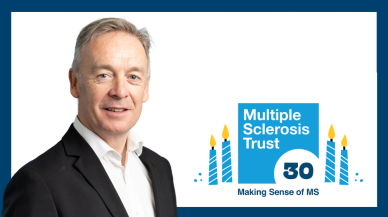We were recently thrilled to mark the MS Trust’s 30th birthday year, by bringing together the largest gathering of MS health professionals in the UK, at our annual conference. All were eager to learn the latest thinking and techniques to treat and care for people with living multiple sclerosis.
So much has changed in the world of multiple sclerosis since our founders, Chris and Jill, started selling Christmas cards to support people living with MS all those years ago.
At this year’s Conference we wanted to celebrate the great journey the MS Trust have been on through the years, making sense of MS together, but also ensure that the focus remains on the future and the work that still needs to be done.
In the run up to Conference I've been doing lots of reflecting, and I couldn’t be prouder of everything we have achieved together over the last 30 years. These are a few of my personal highlights, (in the order they happened).
Information is still our bedrock at the Trust. But did you know it all began in 1995 when we sent out an MS Information Pack to every single neurologist. What a flying start!
I love our helpline and I know lots of people living with MS love it too. The day it started in 1998 was a big day in the Trust’s history. It played a critical role during the pandemic providing vital support for people living with MS. Today, as the only fully professional MS helpline, it’s now more essential than ever.
Through the Risk Sharing Scheme in 2002, the MS Trust really came of age. For those of you that don’t know, the first DMTs were starting to emerge at the beginning of the 21st century, but the Department of Health was reluctant to pay for them without proof that they worked. My predecessors at the Trust were the honest brokers in the Risk Sharing Scheme between the Department of Health and pharma which led to the first DMTs being used successfully by people living with MS. What a great achievement, although did you know that access to those MS drugs today varies from just 52% to 67% in different regions. That’s really concerning and shows there is still work to be done.
I love our website. One of the best things we have ever done on there was in 2015, when we launched our DMT decision tool. So many people with MS have told me how valuable it was for them when they were first diagnosed, and they needed to choose their first disease modifying treatment. It’s just been rebooted and in my humble opinion, it’s better than ever.
You might already be aware of this, but we are the only charity placing additional MS nurses into the NHS through our MS Nurse programme. Our tally since we started the programme in 2017 is already up to nine MS nurses and we are confident that we will be in double figures by the summer.
Sadly, there is still a national shortage of 149 nurses according to our latest nurse mapping survey. We will continue to focus on this shortfall and find ways of doing even more in the future, even though we don’t get a penny from the NHS or the Government.
In 2018, we launched our advanced MS Champions programme. The role is a game changer. The six champions we have already placed have been instrumental in improving the quality of life for some of the 40,000 people living with advanced MS in the UK. Not only that, they are also saving the NHS £250k per role, per year through reduced hospital admissions, less GP appointments and less A & E attendances. A second wave of Champions is in progress, and we will announce updates very soon.
However, for all of this success, and our best efforts, I fear that life for people living with MS has got worse since the pandemic. 130 people are diagnosed with multiple sclerosis every week in the UK. That’s one person every two hours. The challenge is getting bigger and bigger.
There is a postcode lottery for MS services up and down the country and I fear that the situation could actually get worse under new Integrated Care Services (ICSs) unless neurological services that affect one in six people are made a priority. At the moment, that is just not happening.
The need for the MS Trust is as clear as ever, and I’m determined to make sure we continue to be here for everyone living with MS for the next 30 years and beyond.



